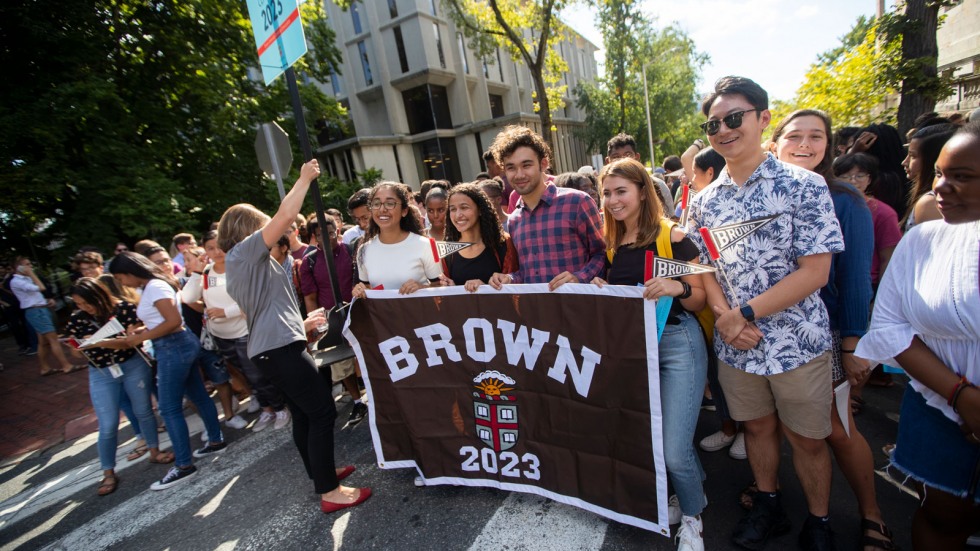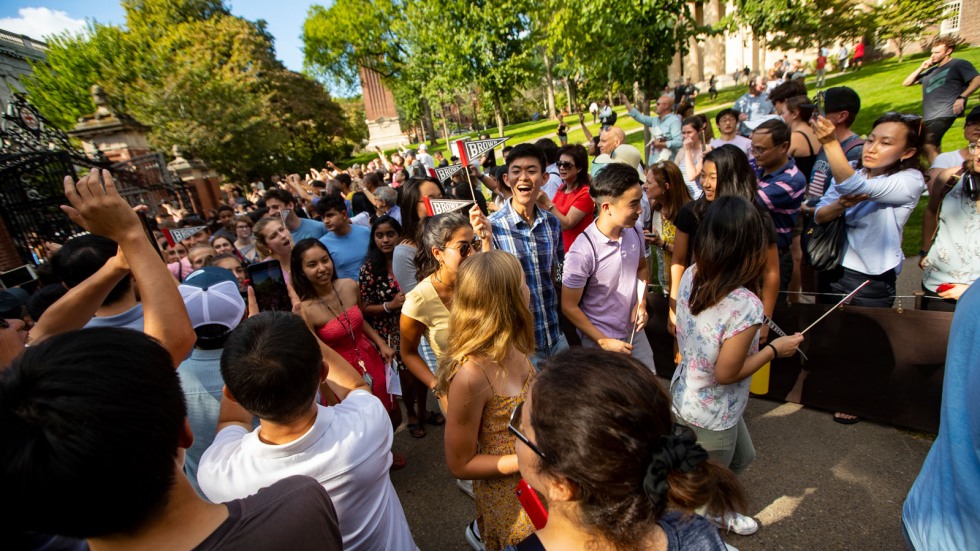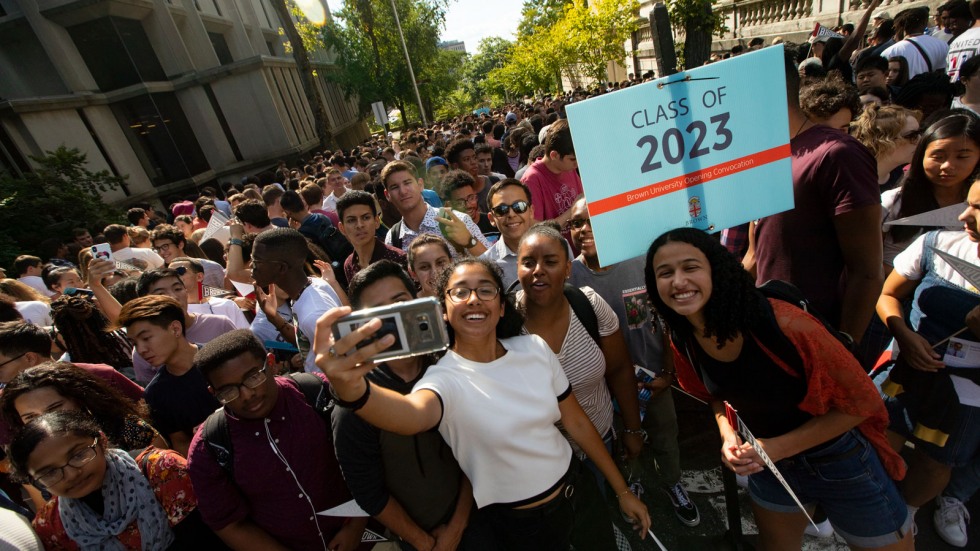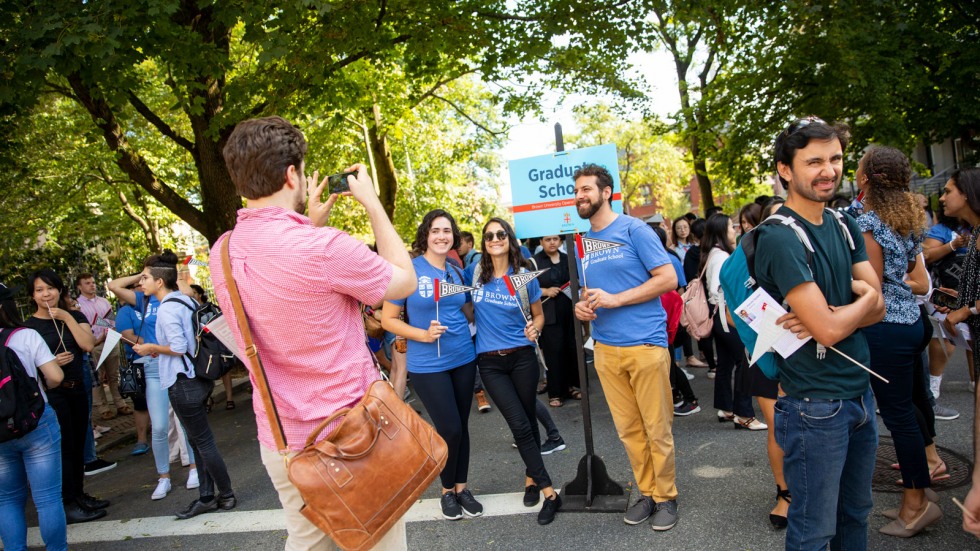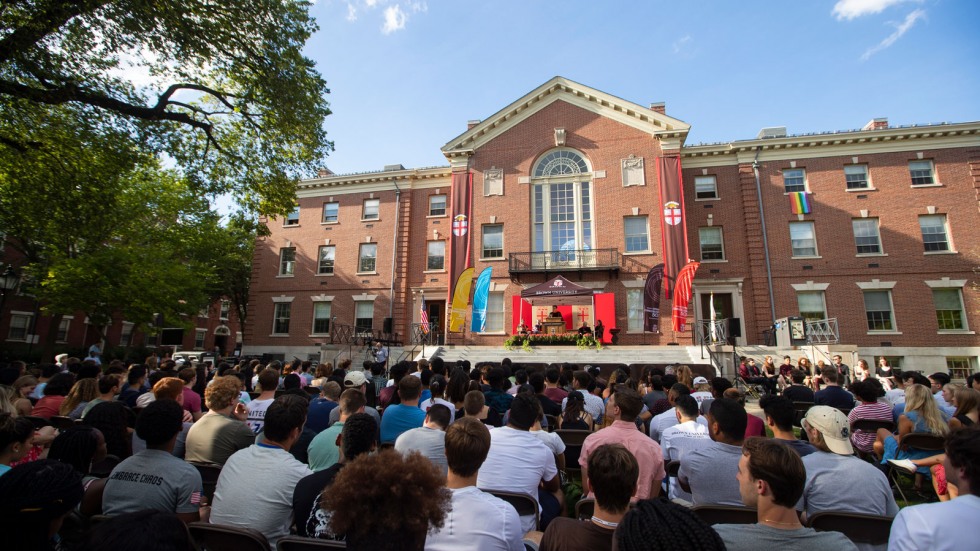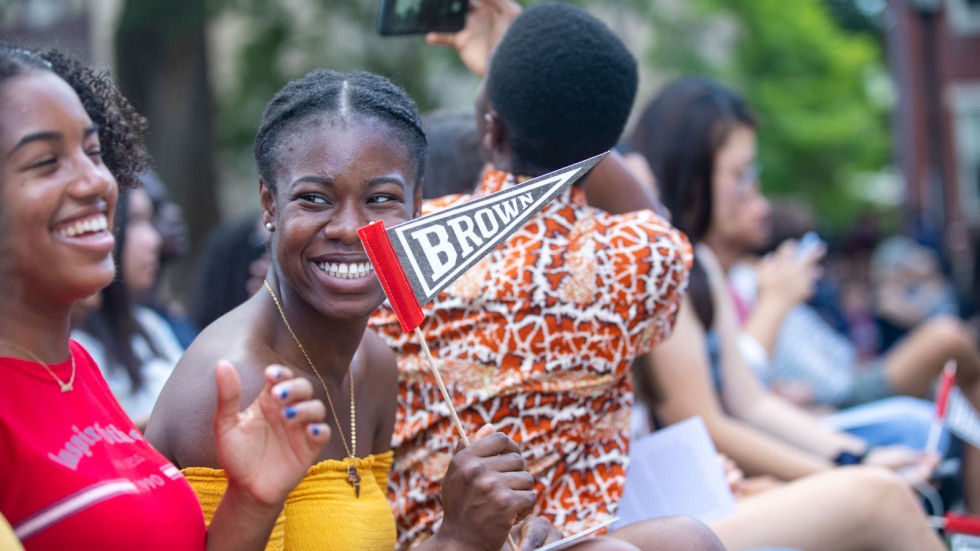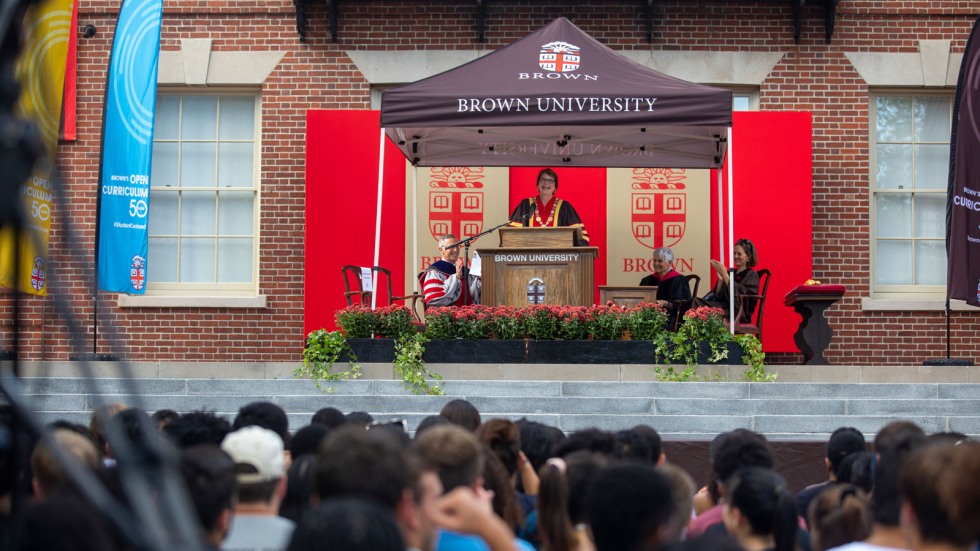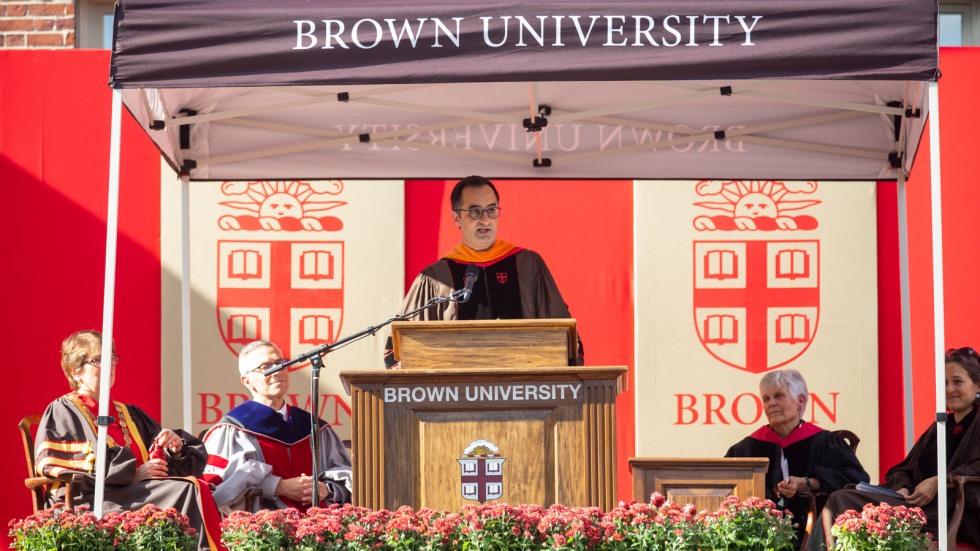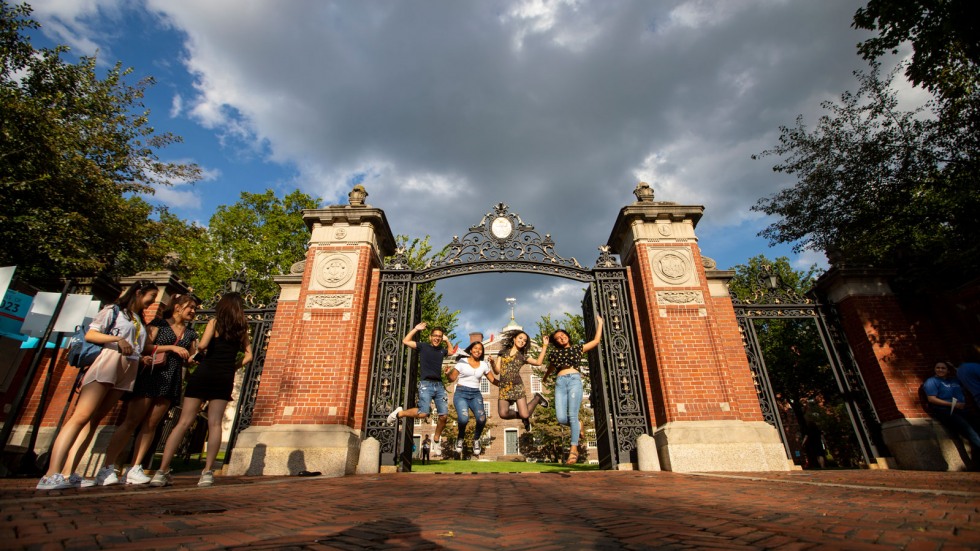PROVIDENCE, R.I. [Brown University] — Warm afternoon sun beamed down on 2,755 new undergraduate, graduate and medical students at Brown University as they passed through the Van Wickle Gates on Tuesday, Sept. 3, for the first of what they expect to be two processions beneath the historic campus landmark.
The 256th annual Opening Convocation, which marked the official launch of Brown’s 2019-20 academic year, also marked a fresh start for students who traveled from every corner of the globe to attend the University. After a busy Labor Day weekend spent moving into residence halls and apartments, attending Orientation programs, and saying goodbye to loved ones, new students had the opportunity on Tuesday to celebrate a new life chapter and contemplate their academic goals.
Following a lively procession through Brown’s famed front gates — which open only to welcome students at Convocation and bid them adieu at Commencement — students, faculty and other members of the University Community settled on the College Green.
There, in an address titled "The Power of Knowledge to Make the World Better,” Brown President Christina Paxson began the joyful ceremony by asking those gathered to take a moment of silence in recognition of a more sober reality — gun violence across the country and the world, and its effects on victims and families.
Often, she noted, when tragic events like the recent shootings in California, Texas and Ohio occur, people feel powerless to make the world better.
“But you don’t have to feel this way,” Paxson encouraged. “And I say this because I know that your Brown experience will empower you to tackle the world’s greatest challenges... Learning how to make the world better is exactly why you are here…your Brown education will give you exactly the right knowledge and experience you’ll need to be a powerful agent of change.”
Paxson cited examples of change agents all over campus: Warren Alpert Medical School faculty member Megan Ranney, an emergency physician whose scholarship and activism is focused on preventing gun violence; the Annenberg Institute for School Reform, whose faculty and students assess how to help struggling school systems prepare children for academic and economic success; work at the Institute at Brown for Environment and Society to develop resilience to climate change and plan for a clean energy future.
“This is the kind of powerful work that you will find here at Brown — work that you can contribute to, through classes, internships, independent research, extracurricular activities,” she said. “My broader point is that knowledge does confer the power to make the world better.”
Paxson added that the opportunity for success and the ability to make an impact are hardly limited to those who study medicine, engineering, computer science or other disciplines where knowledge can be immediately applied to pressing real-world issues — that any academic subject, be it physics or psychology, could yield a life of success and impact.
“For those of you who are drawn to subjects that may seem farther removed from the issues of the day — philosophy, or theater, or theoretical astrophysics — remind yourselves (and, possibly, your skeptical parents!) that you are developing the strongest possible foundation for a life of meaning and purpose,” she said. “The world’s problems can’t be addressed without people who think deeply about ethics; who understand the power of art to raise provocative questions and bring societies together; or who, by studying the universe, are able to see human problems with balance and perspective.”
There is no better example of the power of diverse perspectives than Dean of the College Rashid Zia, Paxson noted in introducing the ceremony’s keynote speaker. Zia earned a combined degree in English and engineering from Brown in 2001 — an accomplishment he noted would not have been possible without the University’s signature Open Curriculum, which celebrates its 50th anniversary this year.
“Rather than beginning with a set of rules, our Open Curriculum is defined by a philosophy of education — an enduring and unifying purpose...” Zia said in an address titled “...And with the Material We Approach Together.” “We are not seeking to create an education that works for most students, or for an idealized student, or for one type of student. Rather, we seek to provide an individualized education for each and every student on this campus.”
In honoring the milestone anniversary of the Open Curriculum, Zia read from a 1969 statement of principles that had come to define Brown’s distinctive approach to education. He believes that the statement, which was co-written by students, faculty and administrators, was built upon a foundation of optimism.
“In many settings, people come together and design rules that avoid conflict,” Zia said. “They seek to anticipate and prevent all that could go wrong. At Brown, we chose 50 years ago to take a different path. Inspired by students like yourselves who imagined what might be the best possible education, our curriculum sets out to promote all that could go right.”
Zia acknowledged that such an unconventional approach to academics has required 50 years of collaboration and trust between students, faculty, staff and administrators. He entreated onlookers to continue to cultivate an environment of trust by keeping an open mind and considering how their actions may impact others.
“Owning our impact begins with empathy, with reflection, and with a sincere commitment both to learn from our mistakes and to take actions to make amends,” Zia said. “It is an active process and a human lesson, a part of our personal and intellectual development.”
Brown’s empathetic, collaborative approach to learning was the very reason Robert Bush, an incoming first-year undergraduate, chose to attend the University, he said as he stood in line for the Convocation procession, Brown pennant in hand.
“I really wanted an environment where it would be people bringing each other up, rather than pushing each other down,” Bush said. “Brown has a community that’s very supportive... and I thought that would really help me learn.”
Bush, a native of Michigan, arrived in Providence two weeks before the start of classes to participate in the Mosaic+ pre-orientation program, which introduces incoming students of color to Brown’s computer science program and a variety of student resources. He said he had already made several friends — including Southern California native Jenna Chu, who joined the very front of the procession through the Van Wickle Gates.
Chu said she plans to concentrate in chemical engineering, but she’s open to multiple possibilities.
“I’ve heard from so many people who come here [with a plan] and change their mind,” Chu said. “I’m at the school of my dreams — and that’s the most important thing to me.”
Chu and Bush both expressed confidence that Brown, and the Open Curriculum, would help guide them toward impactful careers and enriching lives, however their academic and professional journeys may shift.
Zia, who shared in his remarks the unexpected role education played in transforming his family's trajectory, would no doubt have been proud. Decades ago, Zia’s parents had journeyed to the U.S. from Iran so his father could pursue graduate studies. Neither his father nor his mother could have predicted the extent to which education would change their lives, Zia said, ultimately helping them escape the bombs of the Iran-Iraq War.
“Life is so unpredictable, and the impact of education so profound, that whatever those concrete hopes may be that have lifted you to this place today, they most certainly underestimate what will be made possible by your education,” Zia said. “Because education and research and shared knowledge expand the realms of possibility. They allow us to imagine and then realize better lives for ourselves, for our communities, for our world.”
